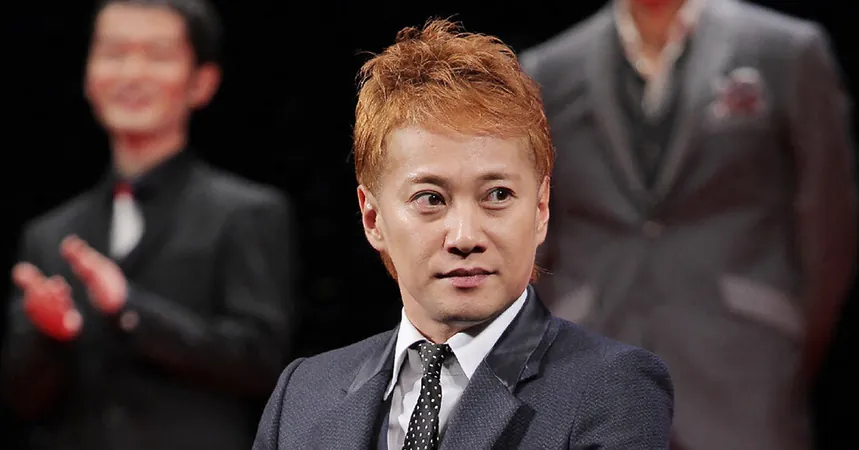
Japanese Broadcaster Faces Advertising Blackout Amid MeToo Scandal: The Untold Consequences!
2025-01-24
Author: Ken Lee
Japanese Broadcaster Faces Advertising Blackout Amid MeToo Scandal: The Untold Consequences!
In a stunning turn of events that underscores the shifting tides of accountability in Japan, a major television broadcaster is facing an advertising crisis after allegations of sexual misconduct surfaced against a high-profile former boy-band star turned TV host. Initially reported by a weekly tabloid, these allegations have spiraled into an explosive MeToo situation, significantly impacting not only the celebrity involved but also Fuji Television, the company that employed him.
The controversy began when it was revealed that the host, who has since announced his retirement, allegedly paid around 90 million yen (approximately $600,000) to silence a woman over unspecified transgressions. Subsequent reports have classified the incident as sexual assault, generating public indignation towards both the individual and the broadcaster for their handling of such serious allegations.
The fallout has been rapid and severe, with approximately 75 major companies, including giants like Toyota, SoftBank, and McDonald’s Japan, ceasing all advertising and sponsorship deals with Fuji Television. As a result, the channel has found itself devoid of any commercial content, with ad slots now replaced by unpaid public service announcements. Corporate sponsors are demanding urgent action and clarity—tens of millions in revenue hang in the balance.
“It is imperative that we regain the trust of our employees, sponsors, and viewers,” said Osamu Kanemitsu, president of Fuji Media Holdings, as he addressed the crisis. The company has pledged to create an independent committee to investigate the allegations and the overall response to the issue, which critics claim was inadequate.
The scandal has drawn parallels to a previous case involving Johnny & Associates, one of Japan's most prominent talent agencies, where systemic abuse by its founder went unchecked for decades. Experts believe the anger sparked by that case prompted a cultural shift, leaving companies less willing to overlook misconduct in the name of profit.
“Corporate sponsors are eager to demonstrate that they have learned from past mistakes,” noted advertising and media analyst Ryu Honma, emphasizing that the current landscape demands a zero-tolerance policy towards sexual misconduct. Honma remarked that the sponsors are now held accountable for their complicity due to inaction and complacency.
Despite the retraction from the spotlight, the former star, now 52, acknowledged his wrongdoing, asserting there was no violence involved in the incident that took place earlier this year. However, such justifications have been met with public outrage. The initial vague response from Fuji Television, which included a denial of the reports, came under fire for not addressing the issue more decisively. A subsequent press conference, framed as an attempt to clarify the situation, faced criticism for being exclusive—no live-streams or recordings were allowed, leading to accusations of a lack of transparency.
As the media landscape evolves, traditional practices are being challenged. Global stakeholders, like the American investment firm Dalton Investments, have not only condemned Fuji’s response but also highlighted the urgent need for corporate governance reform. The mounting pressure from advertisers has forced Fuji TV to reckon with the possibility of lasting reputational damage.
This crisis serves as a pivotal moment for both the entertainment industry and corporate Japan, highlighting the necessary cultural shift towards acknowledging and addressing sexual misconduct. As the story unfolds, the very foundation of public trust in Japan’s media may be at stake, forcing the industry to confront uncomfortable truths and drive change in a society that has long been reluctant to do so.
Stay tuned as developments in this story continue to unfold, revealing the powerful narratives surrounding accountability and change in modern Japan!



 Brasil (PT)
Brasil (PT)
 Canada (EN)
Canada (EN)
 Chile (ES)
Chile (ES)
 Česko (CS)
Česko (CS)
 대한민국 (KO)
대한민국 (KO)
 España (ES)
España (ES)
 France (FR)
France (FR)
 Hong Kong (EN)
Hong Kong (EN)
 Italia (IT)
Italia (IT)
 日本 (JA)
日本 (JA)
 Magyarország (HU)
Magyarország (HU)
 Norge (NO)
Norge (NO)
 Polska (PL)
Polska (PL)
 Schweiz (DE)
Schweiz (DE)
 Singapore (EN)
Singapore (EN)
 Sverige (SV)
Sverige (SV)
 Suomi (FI)
Suomi (FI)
 Türkiye (TR)
Türkiye (TR)
 الإمارات العربية المتحدة (AR)
الإمارات العربية المتحدة (AR)